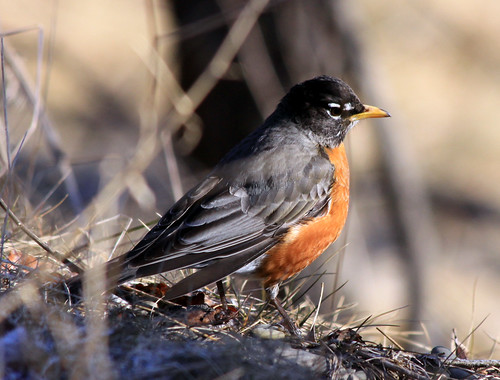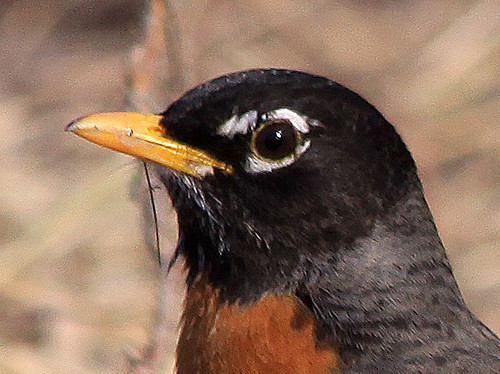 |
My friend Lisa has to be at work at 4:30 each morning, when it’s still dark. She listens to robins each morning. She didn’t actually know it was robins she was listening to, though—it was always too dark to track them down. So she took to calling them the "Prozac Bird." She described the song as "cheer up! cheer up! cheer up!" and said, “He varies the pitch and tone in a silly kind of way that makes you smile!” I sent her to allaboutbirds.org, where you can type in any North American bird and learn about it, including its songs. She took a listen and voila—the robin was, indeed, her Prozac bird.
Robins ostensibly had that effect on Harry Woods, the man who wrote When the Red Red Robin Comes Bob-Bob-Bobbin’ Along. He may have noticed that their song had the capacity to cheer some people, though it’s hard to know for sure whether he was himself cheered by them or not, being known for a cranky disposition and volatile temper. He had been born with no fingers on his left hand, and in a barroom brawl once, he pinned a man down while hitting him with his right hand and bashing him in the face with the stump of his left hand. When police arrived and arrested him, a woman asked, "Who is that horrible man?" A friend of the composer announced, "That's Harry Woods. He wrote Try a Little Tenderness."
People who suffer from depression in the winter are often told that it will dissipate come spring. Sometimes it does as days lengthen, but it’s a slow process, and the depression can feel worse because of the discouragement of not feeling better come May. Therese Borchard writes of this phenomenon, called "Spring Exacerbation":
No one knows why exactly suicides are at their highest this time of year, or why those suffering from SAD can get an extra dose of wham-slam when the sun re-appears. Some say sadness meets a slight energy lift--just enough to act on ruminations. Others speculate that there's a feeling of "Wow it's gorgeous out and I still feel crappy? That must mean I will never be happy."I don’t suffer from depression, but have several close friends who do. Therese Borchard is right that depressed people may feel worse when other people relentlessly tell them to cheer up, but for some reason it doesn’t feel so bad when it’s robins saying it. Of course, robins are hardly intending their songs for humans, which becomes painfully obvious if you ever try photographing a singing robin—they shut right down and leave.
Singing robins are invariably males. Their songs may well have a cheerful effect on their mates, but also serve as stern warnings to other males to keep away from their territories. In their own language, they may be saying “Get out, get out, get out of here.” Whatever it is, Lisa’s Prozac Birds and Woods’s red-red-robins are worth listening to, at 4:30 am or any other time of day, as is Rosie Flores's rendition of Red Red Robin.
 |